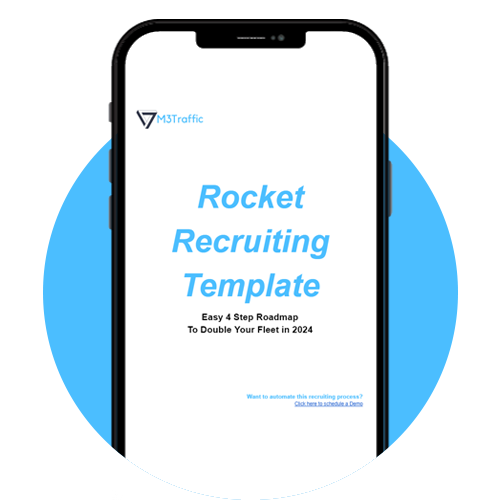Blogs
Learn expert strategies to run your company more effectively with the articles on this blog.
Guest articles, interviews, and step by step guides are all on there. Search through and enjoy.
Blogs
Learn expert strategies to run your company more effectively with the articles on this blog.
Guest articles, interviews, and step by step guides are all on there. Search through and enjoy.

How To Get Your Drivers To Happily Complete Pre-Trip Inspections
How To Get Your Drivers To Happily Complete Pre-Trip Inspections
Introduction
Ensuring the safety and reliability of commercial vehicles is a critical aspect of fleet management. Pre-trip inspections are a vital practice to achieve this, but getting drivers to carry out these inspections willingly, and even happily, can be challenging.
In this insightful conversation, Mitch Adams sits down with Noah Hickey, CEO of Whiparound, to discuss strategies for transforming pre-trip inspections from a tedious chore to an intrinsic part of a driver's routine.
The Importance of Pre-Trip Inspections
Pre-trip inspections are not just about ticking boxes; they are about ensuring the safety of the driver, the vehicle, and the community. When you help make inspections a priority, it reflects on the overall maintenance and performance of the fleet. Here’s why they matter:
Safety: Regular inspections help catch issues early, preventing accidents.
Efficiency: Identifying problems sooner can keep vehicles on the road longer, minimizing downtime.
Compliance: Ensuring inspections are done correctly helps with regulatory compliance.
Key Strategies for Successful Pre-Trip Inspections
Make Inspections Important Within the Organization
If leadership prioritizes inspections, it trickles down to the rest of the team. As Noah pointed out, understanding and advocating for the importance of these inspections is crucial. Treating them as a significant part of the job rather than just another task can change the entire dynamic.
Make it easier
Start by finding just one way you can make these inspections easier for the drivers. Then next week, find one more. Soon enough, it’ll be significantly easier for the drivers. Or you can shortcut it by using a software like whiparound.
Shift Perspective: It’s For Them, Not Just The Company
Drivers need to know how inspections benefit them directly. Emphasize that inspections safeguard their own safety, keep their vehicles in good condition, and ensure consistent work without unexpected breaks due to vehicle issues.
Foster Good Communication
Issues raised during inspections must be resolved swiftly. If drivers report problems but see no action, they’ll quickly lose motivation. Ensuring open lines of communication between drivers, mechanics, and managers is essential.
Conclusion
Creating a culture where pre-trip inspections are valued and understood can significantly impact fleet operations. By making inspections important, simplifying the process, communicating their benefits, and promptly addressing issues, companies can ensure smoother operations and a happier workforce.
What strategies have worked for you in getting drivers engaged with pre-trip inspections? Share your thoughts and experiences in the comments below!

Download Our Rocket Recruiting Template
Easy 4 Step Roadmap To
Double Your Fleet in 2024

How To Get Your Drivers To Happily Complete Pre-Trip Inspections
How To Get Your Drivers To Happily Complete Pre-Trip Inspections
Introduction
Ensuring the safety and reliability of commercial vehicles is a critical aspect of fleet management. Pre-trip inspections are a vital practice to achieve this, but getting drivers to carry out these inspections willingly, and even happily, can be challenging.
In this insightful conversation, Mitch Adams sits down with Noah Hickey, CEO of Whiparound, to discuss strategies for transforming pre-trip inspections from a tedious chore to an intrinsic part of a driver's routine.
The Importance of Pre-Trip Inspections
Pre-trip inspections are not just about ticking boxes; they are about ensuring the safety of the driver, the vehicle, and the community. When you help make inspections a priority, it reflects on the overall maintenance and performance of the fleet. Here’s why they matter:
Safety: Regular inspections help catch issues early, preventing accidents.
Efficiency: Identifying problems sooner can keep vehicles on the road longer, minimizing downtime.
Compliance: Ensuring inspections are done correctly helps with regulatory compliance.
Key Strategies for Successful Pre-Trip Inspections
Make Inspections Important Within the Organization
If leadership prioritizes inspections, it trickles down to the rest of the team. As Noah pointed out, understanding and advocating for the importance of these inspections is crucial. Treating them as a significant part of the job rather than just another task can change the entire dynamic.
Make it easier
Start by finding just one way you can make these inspections easier for the drivers. Then next week, find one more. Soon enough, it’ll be significantly easier for the drivers. Or you can shortcut it by using a software like whiparound.
Shift Perspective: It’s For Them, Not Just The Company
Drivers need to know how inspections benefit them directly. Emphasize that inspections safeguard their own safety, keep their vehicles in good condition, and ensure consistent work without unexpected breaks due to vehicle issues.
Foster Good Communication
Issues raised during inspections must be resolved swiftly. If drivers report problems but see no action, they’ll quickly lose motivation. Ensuring open lines of communication between drivers, mechanics, and managers is essential.
Conclusion
Creating a culture where pre-trip inspections are valued and understood can significantly impact fleet operations. By making inspections important, simplifying the process, communicating their benefits, and promptly addressing issues, companies can ensure smoother operations and a happier workforce.
What strategies have worked for you in getting drivers engaged with pre-trip inspections? Share your thoughts and experiences in the comments below!

Download Our Rocket Recruiting Template
Easy 4 Step Roadmap To Double Your Fleet in 2025
